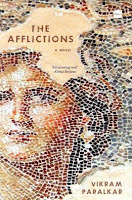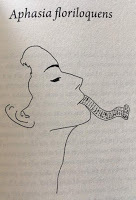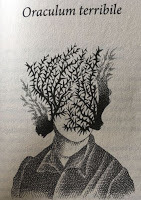The library of weird ailments
[Did this short review for India Today – about Vikram Paralkar’s The Afflictions, a novel (if that’s the right word for it) about a library of very strange, and sometimes recognizable, ailments]
-------------------------------
 What a strange and compelling book this is. It’s easy to call it Borgesian (especially since one of the epigraphs is from Borges’s The Library of Babel), but that doesn’t begin to explain its effect. Nor is it a novel in the sense that most of us are used to – a narrative with a clear beginning, middle and end. Instead, physician-scientist Vikram Paralkar offers us glimpses from the precious Encyclopaedia Medicinae, housed in the Central Library in an unspecified time and place – though the setting and the style of the writing appears medieval.
What a strange and compelling book this is. It’s easy to call it Borgesian (especially since one of the epigraphs is from Borges’s The Library of Babel), but that doesn’t begin to explain its effect. Nor is it a novel in the sense that most of us are used to – a narrative with a clear beginning, middle and end. Instead, physician-scientist Vikram Paralkar offers us glimpses from the precious Encyclopaedia Medicinae, housed in the Central Library in an unspecified time and place – though the setting and the style of the writing appears medieval.Using a very short framing story about a man named Maximo being shown around by the head librarian, the bulk of Paralkar’s book is simply a chronicle of some of the ailments recorded in the encyclopaedia. Grotesque, mystical, these are clearly imagined afflictions – or are they? Some are clearly otherworldly: in “Osteitis deformans preciosa”, the invalid’s bones keep folding back on themselves, even beyond death, until a year later a whole skeleton has been reduced to a concentrated, eyeball-sized diamond. But others are more plausible, with echoes in the human condition as we know it: blank spots in the mind, so that only fragments of certain incidents can be remembered; a disease called “Morbus geographicus” where the patient must detach himself from each place where he has just settled down, and travel to new pastures for healing. Readers familiar with the medical writings of Oliver Sacks (The Man Who Mistook His Wife for a Hat) or VS Ramachandran (Phantoms in the Brain) may be reminded of the more unusual neurological cases discussed in those books.
 Each entry is accompanied by a simple yet resonant illustration by Pia Valentinis, and the writing style is deliberately impassive, though there is some theological speculation: could Cursed Healer Syndrome, in which the sufferer takes on the disfigurements of people around him, be “a gift from the Lord”, a version of Christ suffering for others’ sins?
Each entry is accompanied by a simple yet resonant illustration by Pia Valentinis, and the writing style is deliberately impassive, though there is some theological speculation: could Cursed Healer Syndrome, in which the sufferer takes on the disfigurements of people around him, be “a gift from the Lord”, a version of Christ suffering for others’ sins?“If you read the Encyclopaedia from beginning to end,” the head librarian says, “you get the feeling that every affliction known to man is part of a single, infinite progression. Or that every disease is a different facet of a great and terrible malady.” This book is a commentary on the multi-pronged relationship between our bodies and minds – something that even today’s science is incapable of revealing too much about. There are reflections on the nature of memory, and on the creation of art: one disease causes the ears of
 illiterate peasants to ring with sounds that turn out to be notes from a sophisticated musical composition; another gives its victims such powerful visions that they have no option but to express them through art, but flounder, producing only mediocre books and paintings. (How relatable this would be to the countless frustrated Salieris of the real world!)
illiterate peasants to ring with sounds that turn out to be notes from a sophisticated musical composition; another gives its victims such powerful visions that they have no option but to express them through art, but flounder, producing only mediocre books and paintings. (How relatable this would be to the countless frustrated Salieris of the real world!) And occasionally, there is something that reads like a straightforward anthropological observation. Individuals with “Empathia pathologica”, we are told, develop a crippling susceptibility to the moods of others: “It is only in absolute seclusion, far from all human contact, that they can be certain they are savouring joys or sorrows that are truly their own.” <!-- /* Font Definitions */ @font-face {font-family:"Cambria Math"; panose-1:2 4 5 3 5 4 6 3 2 4; mso-font-charset:1; mso-generic-font-family:roman; mso-font-format:other; mso-font-pitch:variable; mso-font-signature:0 0 0 0 0 0;} @font-face {font-family:Calibri; panose-1:2 15 5 2 2 2 4 3 2 4; mso-font-charset:0; mso-generic-font-family:auto; mso-font-pitch:variable; mso-font-signature:-536870145 1073786111 1 0 415 0;} /* Style Definitions */ p.MsoNormal, li.MsoNormal, div.MsoNormal {mso-style-unhide:no; mso-style-qformat:yes; mso-style-parent:""; margin:0cm; margin-bottom:.0001pt; mso-pagination:widow-orphan; font-size:12.0pt; font-family:Calibri; mso-ascii-font-family:Calibri; mso-ascii-theme-font:minor-latin; mso-fareast-font-family:Calibri; mso-fareast-theme-font:minor-latin; mso-hansi-font-family:Calibri; mso-hansi-theme-font:minor-latin; mso-bidi-font-family:"Times New Roman"; mso-bidi-theme-font:minor-bidi;} .MsoChpDefault {mso-style-type:export-only; mso-default-props:yes; font-family:Calibri; mso-ascii-font-family:Calibri; mso-ascii-theme-font:minor-latin; mso-fareast-font-family:Calibri; mso-fareast-theme-font:minor-latin; mso-hansi-font-family:Calibri; mso-hansi-theme-font:minor-latin; mso-bidi-font-family:"Times New Roman"; mso-bidi-theme-font:minor-bidi;} @page WordSection1 {size:612.0pt 792.0pt; margin:72.0pt 72.0pt 72.0pt 72.0pt; mso-header-margin:36.0pt; mso-footer-margin:36.0pt; mso-paper-source:0;} div.WordSection1 {page:WordSection1;} </style><br />--></div>
Published on January 27, 2019 22:35
No comments have been added yet.
Jai Arjun Singh's Blog
- Jai Arjun Singh's profile
- 11 followers
Jai Arjun Singh isn't a Goodreads Author
(yet),
but they
do have a blog,
so here are some recent posts imported from
their feed.



